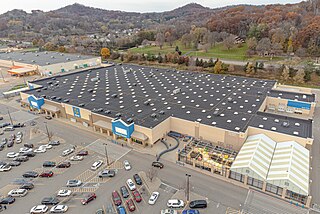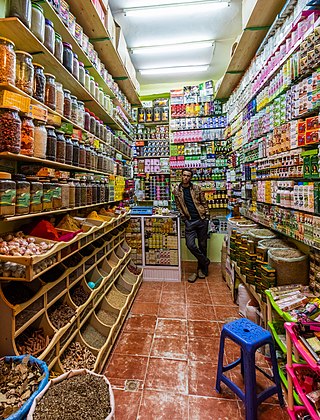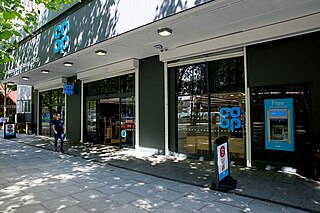E-commerce is the activity of electronically buying or selling products on online services or over the Internet. E-commerce draws on technologies such as mobile commerce, electronic funds transfer, supply chain management, Internet marketing, online transaction processing, electronic data interchange (EDI), inventory management systems, and automated data collection systems. E-commerce is the largest sector of the electronics industry and is in turn driven by the technological advances of the semiconductor industry.

Walmart Inc. is an American multinational retail corporation that operates a chain of hypermarkets, discount department stores, and grocery stores in the United States, headquartered in Bentonville, Arkansas. The company was founded by brothers Sam and James "Bud" Walton in nearby Rogers, Arkansas in 1962 and incorporated under Delaware General Corporation Law on October 31, 1969. It also owns and operates Sam's Club retail warehouses.

A convenience store, bodega, convenience shop, corner store or corner shop is a small retail store that stocks a range of everyday items such as tea, coffee, groceries, fruits, vegetables, snacks, confectionery, soft drinks, ice creams, tobacco products, lottery tickets, over-the-counter drugs, toiletries, newspapers and magazines. In some jurisdictions, convenience stores are licensed to sell alcoholic drinks, although many jurisdictions limit such beverages to those with relatively low alcohol content, like beer and wine. The stores may also offer money order and wire transfer services, along with the use of a fax machine or photocopier for a small per-copy cost. Some also sell tickets or recharge smart cards, e.g. OPUS cards in Montreal or include a small deli. They differ from general stores and village shops in that they are not in a rural location and are used as a convenient supplement to larger stores.

A supermarket is a self-service shop offering a wide variety of food, beverages and household products, organized into sections. This kind of store is larger and has a wider selection than earlier grocery stores, but is smaller and more limited in the range of merchandise than a hypermarket or big-box market. In everyday U.S. usage, however, "grocery store" is often used to mean "supermarket".

Shopping is an activity in which a customer browses the available goods or services presented by one or more retailers with the potential intent to purchase a suitable selection of them. A typology of shopper types has been developed by scholars which identifies one group of shoppers as recreational shoppers, that is, those who enjoy shopping and view it as a leisure activity.

Retail is the sale of goods and services to consumers, in contrast to wholesaling, which is sale to business or institutional customers. A retailer purchases goods in large quantities from manufacturers, directly or through a wholesaler, and then sells in smaller quantities to consumers for a profit. Retailers are the final link in the supply chain from producers to consumers.

A grocery store (AE), grocery shop (BE) or simply grocery is a foodservice retail store that primarily retails a general range of food products, which may be fresh or packaged. In everyday U.S. usage, however, "grocery store" is a synonym for supermarket, and is not used to refer to other types of stores that sell groceries. In the UK, shops that sell food are distinguished as grocers or grocery shops.

A big-box store is a physically large retail establishment, usually part of a chain of stores. The term sometimes also refers, by extension, to the company that operates the store. The term "big-box" references the typical appearance of buildings occupied by such stores.

Once the strategic plan is in place, retail managers turn to the more managerial aspects of planning. A retail mix is devised for the purpose of coordinating day-to-day tactical decisions. The retail marketing mix typically consists of six broad decision layers including product decisions, place decisions, promotion, price, personnel and presentation. The retail mix is loosely based on the marketing mix, but has been expanded and modified in line with the unique needs of the retail context. A number of scholars have argued for an expanded marketing, mix with the inclusion of two new Ps, namely, Personnel and Presentation since these contribute to the customer's unique retail experience and are the principal basis for retail differentiation. Yet other scholars argue that the Retail Format should be included. The modified retail marketing mix that is most commonly cited in textbooks is often called the 6 Ps of retailing.

Taobao is a Chinese online shopping platform. It is headquartered in Hangzhou and is owned by Alibaba. According to Alexa rank, it was the eighth most-visited website globally in 2021. Taobao.com was registered on April 21, 2003 by Alibaba Cloud Computing (Beijing) Co., Ltd.

Retailing in India is one of the pillars of its economy and accounts for about 10 percent of its GDP. The Indian retail market is estimated to be worth $1.3 trillion as of 2022. India is one of the fastest growing retail markets in the world, with 1.4 billion people.

Co-op Food is a brand used for the food retail business of The Co-operative Group in the United Kingdom.
An online grocer is a supermarket or grocery store that allows ordering via websites or mobile apps. The order can either be collected by the customer or delivered to the customer by drivers engaged by the grocer, a food delivery service, or by delivery drones and robots.
Tmall, formerly Taobao Mall, is a Chinese-language website for business-to-consumer (B2C) online retail, spun off from Taobao, operated in China by Alibaba Group. It is a platform for local Chinese and international businesses to sell brand-name goods to consumers in Greater China. It has over 500 million monthly active users, as of February 2018. In the last few years, it has opened its features to brands, not only for online sales but also for developing brand awareness. According to Alexa Rank, it is the third most visited website globally in 2021.

JD.com, Inc., also known as Jingdong, internationally known as Joybuy and formerly called 360buy, is a Chinese e-commerce company headquartered in Beijing. It is one of the two massive B2C online retailers in China by transaction volume and revenue, a member of the Fortune Global 500 and a major competitor to Alibaba-run Tmall. When classified as a tech company, it is the largest in China by revenue, and 7th in the world in 2021.
Yihaodian is a Chinese online grocery business founded by Gang Yu and Junling Liu in July 2008. Yihaodian is a business-to-consumer (B2C) e-commerce website that provides people with a platform to shop groceries online. Yihaodian has “virtual stores” that exhibit images of stocked grocery shelves on walls and other surfaces in urban public areas in China, which passersby can scan codes under the images with a mobile device to purchase corresponding groceries online. The retail giant Walmart first invested in Yihaodian in 2011; in 2012, it announced additional investment so that Walmart controlled 51% of Yihaodian’s ownership. In July 2015, Walmart acquired 100% ownership of Yihaodian.
The term dark store, dark shop, dark supermarket or dotcom centre refers to a retail outlet or distribution centre that exists exclusively for online shopping. A dark store is generally a large warehouse that can either be used to facilitate a "click-and-collect" service, where a customer collects an item they have ordered online, or as an order fulfillment platform for online sales. The format was initiated in the United Kingdom, and its popularity has also spread to France followed by the rest of the European Union and Russia, as well as to the United States.

Kurt Jetta is a consumer researcher who studies data about multinational corporations through his firm, TABS Analytics, which is based in Shelton, Connecticut. The corporations Jetta has analyzed include Amazon, Family Dollar, Dollar Tree, Walmart, Apple. In addition, Jetta has also studied the organic food industry, the vitamin industry, and the online grocery industry. Other investigations led by Jetta include sociological research that pertains to the purchasing habits of various ethnic groups. In the area of trade promotion, Jetta has developed an alternative methodology to current industry baseline models. Jetta also analyzes rewards programs. He was a 2017 Republican candidate in Florida’s 21st Congressional District.
The fast-moving consumer goods (FMCG) industry or consumer packaged goods (CPG) industry is mainly responsible for producing, distributing and marketing fast-moving consumer goods. The FMCG industry is the fourth largest sector in the Indian economy. Household and personal care products accounts for 50% of the sales in the industry, healthcare accounts for 31-32% and food and beverage accounts for the remaining 18-19%.
The retail format influences the consumer's store choice and addresses the consumer's expectations. At its most basic level, a retail format is a simple marketplace, that is; a location where goods and services are exchanged. In some parts of the world, the retail sector is still dominated by small family-run stores, but large retail chains are increasingly dominating the sector, because they can exert considerable buying power and pass on the savings in the form of lower prices. Many of these large retail chains also produce their own private labels which compete alongside manufacturer brands. Considerable consolidation of retail stores has changed the retail landscape, transferring power away from wholesalers and into the hands of the large retail chains.












